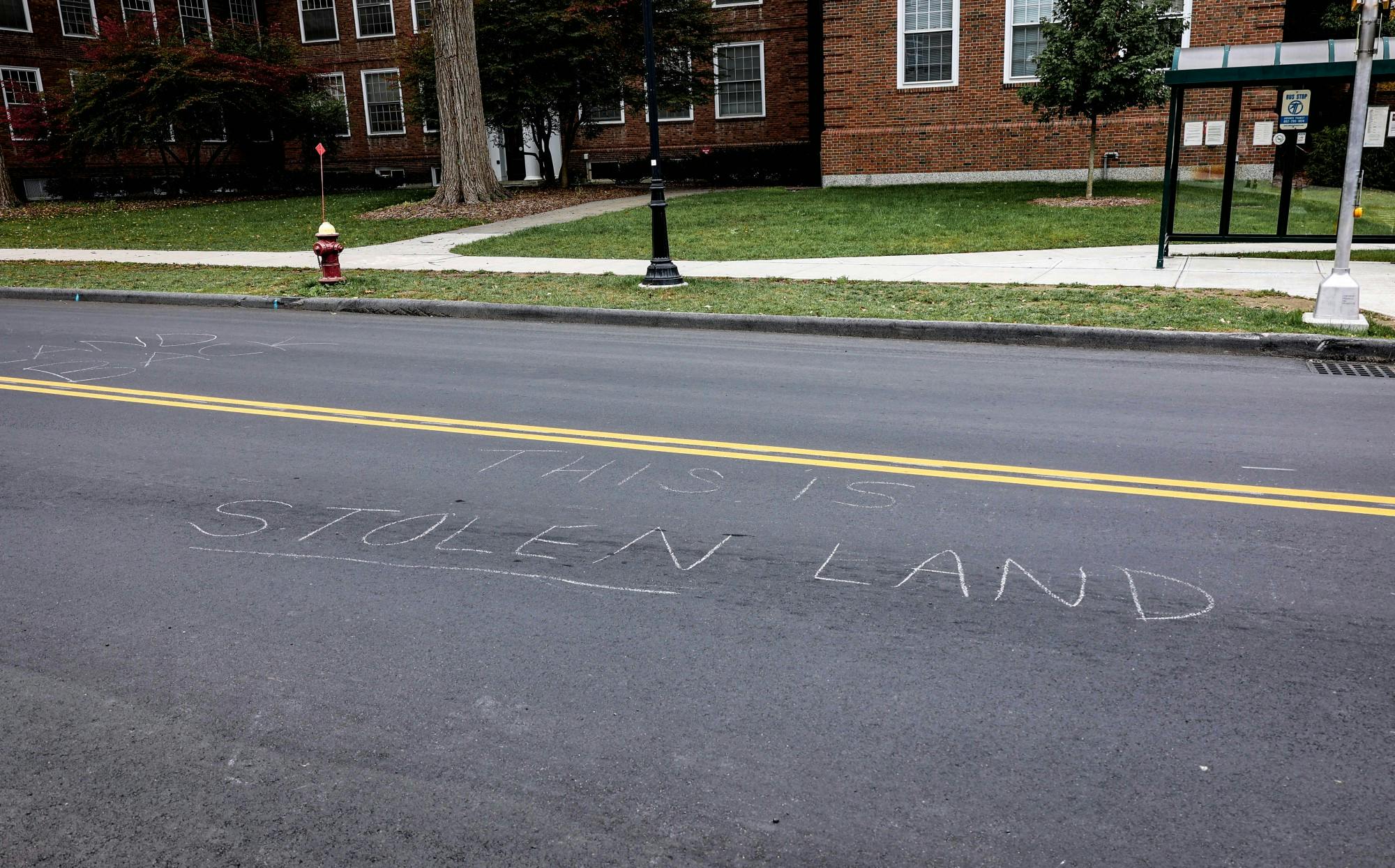On Oct. 11, Indigenous students at the College commemorated Indigenous Peoples’ Day by engaging in programming and protest.
The holiday — symbolically held on the same day as Columbus Day each year — rejects celebrating Christopher Columbus, whose discovery of the Americas in 1492 precipitated a mass genocide of Indigenous peoples. As of 2021, over a dozen states and over a hundred cities celebrate Indigenous Peoples’ Day in place of Columbus Day, and In a historic Oct. 8 proclamation, President Biden declared Indigenous Peoples’ Day a federal holiday — the first time a president had acknowledged the holiday.
For those who honor the holiday, Indigenous Peoples’ Day serves as a marker of “resilience” and “permanence” in the context of a “violent history,” according to co-president of Native Americans at Dartmouth Erin Bunner ’22.
“Every year, our main message that we’re trying to push is that we want Dartmouth to derecognize Columbus Day and formally recognize Indigenous Peoples’ Day,” Bunner said. “Our main message of the protests is the [derecognition] of Columbus Day, but it’s also about celebrating Indigenous resiliency and joy and the diverse cultures and languages that have survived centuries of violence.”
NAD programming for the holiday included poster-making, chalking on campus sidewalks and building walls with messages like “This is Abenaki Land,” “Natives found Columbus” and “Land Back.” The group also led a silent protest on the Green and lit a sacred fire. More events — both private to NAD members and open to campus — will take place throughout Indigenous Peoples’ Month this October.
On the night of Oct. 10, a group of 30 to 40 NAD members marched through the library behind an Abenaki hand drummer to initiate the festivities, according to NAD secretary Kendra Elk Looks Back ’24. The group concluded its march on the Green around midnight, at which point NAD members took part in a ceremony for students from different tribes, Harley Kell ’24 said.
For Bunner, taking action at the College is especially important in light of Dartmouth’s history of seizing native Abenaki land.
“We think it’s especially important to call attention to a whitewashed American history, such as a narrative surrounding Columbus Day at a place like Dartmouth that was originally established to further a colonial agenda of Christianizing Indigenous people,” Bunner said.
While Dartmouth contends with a controversial history involving the subjugation of Native Americans, it also maintains a robust Native American Program, according to Kell.
“The Native American Program has offered a set of people, upperclassmen and faculty at Dartmouth who are looking out for me, and they especially were during [COVID-19],” Kell said. “Being able to participate in welcoming environments is really important. It makes me feel very included in the community.”
While NAD offered programming both open to campus and limited to Indigenous students for Indigenous People’s Day, the College itself did not issue a statement in recognition of the holiday. For Elk Looks Back, not only did Dartmouth fail to adequately acknowledge the holiday, but its decision to host Canadian Thanksgiving at the Class of ’53 Commons on the night of Indigenous Peoples’ Day was “a punch in the face.”
“A lot of non-NADs expressed outrage to me about how there was no email or anything today,” Elk Looks Back said. “The bar is very low for an institution with this history and the Native grounds it was made on … the bar is literally in hell.”
Bunner said that NAD has explicit changes it would like to see on campus in the future, such as exhibiting a land acknowledgement plaque in a highly visible place, hiring more Indigenous staff for the Native American Program, officially derecognizing Columbus Day and celebrating Indigenous Peoples’ Day as an official holiday. Kell also expressed that non-Indigenous people should use the day to familiarize themselves with pressing issues facing Native communities, learn about Indigenous cultures and commit to taking classes in the NAS department.
“It’s a day of reflection for non-Indigenous people, and I hope that our celebrations and presence on campus call attention to that,” Bunner said. “It’s about asking yourself what myths and stereotypes you have internalized. What have you gained from Indigenous people around you? Whose land do you occupy? What can you do to further uplift Indigenous peoples?”
Despite Dartmouth’s history, NAP interim director Michael Hanitchak ’73 sees Indigenous Peoples’ Day as an opportunity to shape a positive future.
“[Indigenous Peoples’ Day] is a marker of what has transpired in the last 500 years between Indigenous peoples and others — both good and bad,” Hanichak wrote in an emailed statement. “We remember the bad so that we might prevent those things from happening again. Indigenous People’s Day is a good day to bring good thoughts to all who choose to participate in creating a good future for all who will come after us.”
Programming later this month includes an exhibition at the Black Family Visual Arts Center student gallery on Oct. 15 entitled “We Are Still Here” and an Indigenous People’s Month fashion show on Oct. 21 at the Hood Museum of Art.




